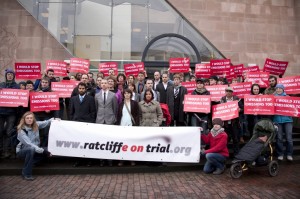 The media has paid a lot of attention to public protest in England this past week. Getting less attention is a fascinating trial of 20 climate change activists who were arrested in a night-time police raid in April 2009, on the eve of their attempt to shut down E.ON’s Ratcliffe-on-Soar coal power station, the United Kingdom’s third largest source of climate emissions.
The media has paid a lot of attention to public protest in England this past week. Getting less attention is a fascinating trial of 20 climate change activists who were arrested in a night-time police raid in April 2009, on the eve of their attempt to shut down E.ON’s Ratcliffe-on-Soar coal power station, the United Kingdom’s third largest source of climate emissions.
Had the action gone ahead as planned it would have stopped around 150 thousand tonnes of carbon emissions from being released into the atmosphere, while drawing attention to the failure of provided democratic channels. If found guilty, the defendants could face up to three months in jail.
The case has now been in court for three weeks, with the defendants presenting compelling evidence from leading scientists, including NASA’s James Hansen, that climate change is real and man-made, of the devastating impacts of climate change, and of the failures of the democratic process — our elected Governments — to address climate change. Using this type of logic in a trial is sometimes referred to as a “necessity defense”.
Having heard all the evidence, today, the Judge concluded his summing up and directions to the jury.
Alan ‘Tash’ Lodge is an English photographer who has been covering the British environmental direct action movement for several decades. His excellent blog is a recommended read. Tash has been in court with the Radcliffe defendants and provides the following summary:
“His Honour Judge Teare concludes his summing up and directions. He reminds the jury that from the evidence presented, you might conclude that climate change is happening, it is human driven and the associated effects of it are as has been described. The burning of fossil fuels is mainly responsible and that coal is the biggest contributor. Further Ratcliffe is the 2nd largest producer of such emission in the UK.
The Judge suggests to the jury that to get any action on the issue the choice is between democratic methods, the difficulties of which have been presented Vs. the necessity of action.
So was it to save someone’s life on the planet or not? Please return a verdict on which you are all agreed. A majority verdict is not acceptable in this case.
At 10.20am, the jury retires to consider their verdict.
Having spent the day deliberating, the court was reconvened twice during the day in order to answer jury questions. The first concerned the details of evidence given by former Nottingham MP Alan Simpson about EU directives. The second concerned defining exactly which lives the defendants needed to be protecting in order to justify their actions being necessary in law. The judge explained that the lives did not need to be local to the power station or Nottingham, but could be anywhere in the world. The trial has heard factual evidence from people suffering from the worst excesses of climate change, in locations ranging from Hull to Bangladesh.
The jury will return to court at 10am on Monday
This case is important for the freedom to protest. The activists on trial are ordinary people experiencing the failures of the present political system who remain determined to see action taken on climate change. As yet another global climate summit fails to reach agreement, and as our countries consistently fail to pass legislation to restrict our carbon emissions at the levels we need to avert catastrophe, we are compelled to use a broader range of tactics to defend the planet.